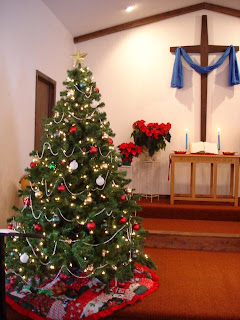 Pastor Brad Shannon opened the service with the reminder that Christmas is a season, not just a day.
Pastor Brad Shannon opened the service with the reminder that Christmas is a season, not just a day.The New Life Trio blessed us with their music and singing this morning, and then we shared in the baptism of Gavin Edward Gimpel.
Today’s Scripture readings:
Isaiah 63:7-9
Hebrews 2:10-18
Pastor Brad's sermon began with a re-cap of the Christmas Eve service beginning with that wonderful proclamation, "For to us a child is born, to us a son is given, and the government will be on his shoulders. And he will be called Wonderful Counselor, Mighty God, Everlasting Father, Prince of Peace." ~ Isaiah 9:6
Titled, “Shhh... God Is Speaking,” Pastor Brad reminded us of the reality that God still speaks to us today and can guide us. And that God gives us clues when it is important. The most significant and vivid manner in which God speaks to us is through His son.
1In the past God spoke to our forefathers through the prophets at many times and in various ways, 2but in these last days he has spoken to us by his Son, whom he appointed heir of all things, and through whom he made the universe. 3The Son is the radiance of God's glory and the exact representation of his being, sustaining all things by his powerful word. ~ Hebrews 1:1-3
Christmas Eve Pastor Brad told a parable by Kierkegaard that revealed two important truths: (1) That God still speaks, and (2) He speaks authoritatively and definitively through Jesus.
This was the supreme revelation, that God set aside His glory for peasants like us. Pastor Shannon implored, “Will you open up your life to let Him speak to you?”
He told a story about a Chicago Cubs fan named Johnny who as a twelve year old idolized the Cubs of the 60’s, a team with many stars including Ernie Banks and Ron Santos, among others. They had a star catcher named Randy Hundley who was also a Christian, and on one occasion was visiting the house across the street. The family across the street knew he was a Cubs fan, and called to say that Randy Hundley would like to come over and meet him. His mother said he was busy and should come play with Johnny “some other time.” Of course when Johnny got home he became depressed upon hearing the news that one of his idols had been so near.
As it turned out, after his speaking engagement, the All-Star catcher stopped by the house and did ultimately meet his young fan. He even pulled out a baseball, signed it and gave it to Johnny, securing his admiration forever.
For Johnny, the glory of Randy Hundley was not his rifle arm or his home run power, but the fact that someone as important as him came to his house, “just for me.”
So it is that the Son of God has come to us. As the Scripture exclaims, “Behold, I stand at the door and knock If anyone hears my voice and opens the door, I will come in and eat with him, and he with me.” ~ Rev. 3:20
This is the glory of God.
Sadly, sometimes he knocks for years. We receive promptings, but never respond. Today, I’m asking you to open your door, the door to your heart, to Jesus.
The passage from Isaiah 9:6 cites four names. The first of these is Wonderful Counsellor. Some people have problems or challenging decisions they are wrestling with. Sometimes as wrong decision can mess up your life. In times like these we need God’s wisdom, we need a wonderful counselor.
The second, He is called The Mighty God. When we face things that are too big for us, we need a powerful God, a mighty God. Pastor Brad shared stories of tough situations in which God’s power was needed. To each of us He says, “Let me be a mighty God for you.”
The third name: Everlasting Father. “I will be your Father, you will be my children,” the Scripture says.
The pastor told us a story about a frightened boy who at night felt all alone. When overcome by his fear and aloneness he would go to his father’s bedroom, needing to be with his father. Thus comforted, he could sleep and let go of his fear. “God wants to be for you your Everlasting Father.”
The fourth name, Prince of Peace, speaks on many levels. Individually, Jesus became the way for us to have peace with God. He died on a cross that we can be reconciled.
“Jesus is knocking. Some of you here this morning need to open the door of your hearts. For some of you Jesus is knocking right now.”












